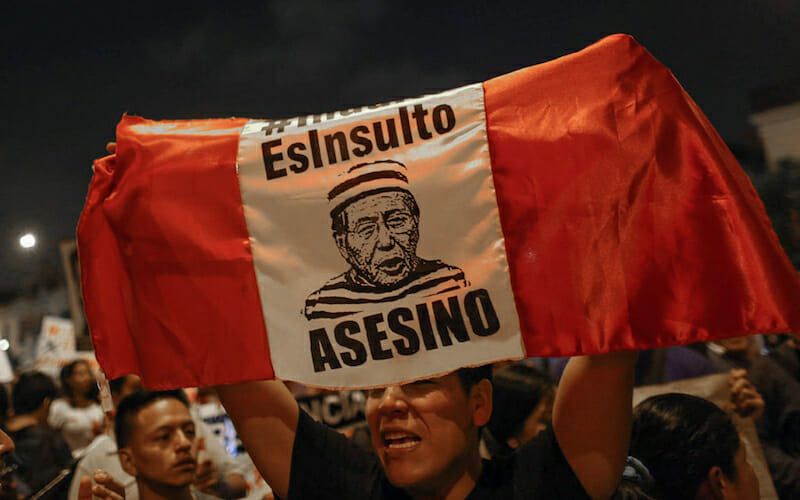
Peru’s Kuczynski Pardons Fujimori to Save His Skin
On December 21, 2017, Reuters reported that disgraced ex-president Alberto Fujimori, in power from 1990 to 2000, had requested an official pardon from current President Pedro Kuczynski. The pardon was medical in nature; Kuczynski’s press release found that “prison conditions mean a serious risk to [Fujimori’s] life, health and integrity.” Fujimori requested the pardon “hours before [his] sympathizers in Congress vote on whether to remove Kuczynski from office.” Kuczynski then publicly pardoned Fujimori on December 24, 2017. In order to understand the significance and implications of the pardon, we must first delve into the current political situation in Peru.
Kuczynski was accused in the Odebrecht investigations of accepting $4.8 million illegally. The Peruvian Congress voted 93–17 to begin impeachment proceedings. However, President Kuczynski was not impeached on December 22; 87 votes were needed for his impeachment and only 78 representatives voted in favor of his removal. According to The Washington Post, he “survived an impeachment vote…after 10 members of a hard-right opposition party decided at the last minute to break ranks and abstain.” The opposition party referred to is the Popular Force Party, currently headed by Alberto Fujimori’s daughter, Keiko Fujimori (who also ran against Kuczynski for the presidency in 2016). The group of individuals who chose not to vote for the impeachment have been identified by The New York Times as a “faction…led by her younger brother, Kenji [Fujimori].”
Some have argued, as cited in the Washington Post, that the speed in this impeachment process “violate[s] due process” and that Keiko Fujimori is “using the controversy as a pretext for an unconstitutional power grab.” This article also notes that both Keiko Fujimori herself, as well as her party, are being accused of accepting Odebrecht-tainted money. However, the quick nature of the impeachment process appears to have backfired on Keiko. This speediness might also indicate the need for Kuczynski to make a snap decision — even one destructive to his legacy — in order to hold onto power.
This political pardon appears to be just what Kuczynski needed to cling to the presidency. This is both monumental and alarming for a number of reasons; it has shaken government officials and civilians alike.
Fujimori’s Record of Human Rights Abuses
Alberto Fujimori is in prison for human rights abuses directly related to his presidency. While some in Peru praise him for his role in “largely defeating the Shining Path insurgency,” it has also been argued that his government’s crackdown was targeted against more than just militants. Fujimori is accused of operating a military group — the Colina Group — during his presidency that targeted and murdered civilians. He was found guilty of these charges in 2010 and was sentenced to 25 years in prison. For many in Peru, this was monumental; they recalled the many years that it took to bring Fujimori to justice. Having fled Peru for Japan, where he was also a citizen, there was little hope to extradite him from there. Fujimori then landed on Chilean soil, where the Peruvian government requested an extradition. In what Human Rights Watch noted as a “welcome and unprecedented” move, the Chilean Supreme Court allowed Fujimori to be extradited and returned to Peru, where he would be tried for his crimes. Fujimori’s pardon now negates his 25-year sentence.
Erika Quinteros, a researcher and human rights expert currently living in Lima, remarked that, “This is so bad for many reasons; one of them, of course, is that it creates a terrible precedent for human rights violations. Moreover, this pardon was seemingly offered in exchange for saving [Kuczynski] from impeachment — he betrayed his voters and his supporters, and he broke his promise to respect the sentences of human rights violators.”
Quinteros also noted in her report “Former Peruvian President Alberto Fujimori to Face Trial for Forgotten Massacre” in the Washington Report on the Hemisphere that he has not faced justice for other human rights abuses, such as the Pativilca Massacre and will not be prosecuted for these crimes, due to the pardon.
The Pardon Lacks Legitimacy
The article “Risking a Legacy” in U.S. News and World Report explains that President Kuczynski’s pardon is a reversal of a promise made during his campaign for presidency. This pardon might also be legally invalid. According to a piece in The New York Times, a pardon is not allowed by the regulations of the Inter-American Human Rights Court. U.S. News and World Report cites former justice minister Antonio Vásquez Ríos, who stated that the nature of his crimes — “crimes against humanity” — does not make him “eligible for a regular pardon” and that “any reprieve on grounds of ill health would require the former president to be certified as seriously or terminally sick by a panel of independent doctors.” Lima’s Pro-Human Rights Association will be moving forward in an attempt to undo the pardon as well as request Fujimori’s medical records.
A Country Divided
Quinteros reminds that, “The country has been, and is still, divided on this particular issue, so it does not surprise me that even on Christmas Eve (which, for Peruvians, is more important than the actual Christmas day) people gathered in the center of Lima and in San Isidro (where [Kuczynski] lives) to protest against his decision to pardon Fujimori.” A telltale sign of this division in opinion can be found in the last election, which pitted Keiko Fujimori against Kuczynski. There were enough votes for Keiko Fujimori — she lost by only 42,000 votes out of 18,000,000 — to indicate segments of the population still support, or are able to overlook the human rights abuses, of her father, Alberto Fujimori.
The impact of this pardon has profoundly shaken the Peruvian government, resulting in a number of resignations. Three congressmen of Kuczynski’s Peruvians for Change party have resigned since the pardon, as well as the deputy human rights minister. Additionally, the interior minister and the culture minister resigned as well. U.N. officials have also gone on record to condemn the pardon.
The civilian population has intensely responded to the pardon. Peru has erupted into protests. According to The Independent, 5,000 protesters took to the streets on Christmas day to express their disapproval. Another protest was held yesterday in Lima, calling for the resignation of Kuczynski and revocation of the pardon. Protesters carried images of those killed by Fujimori’s Colina Group, a grim reminder that this pardon cannot erase Fujimori’s human rights abuses in the memories of Peruvian citizens.
Quinteros attended the protest yesterday and reported the following: “Different groups gathered in different places, but I went to Plaza San Martin. Plaza San Martin was closed by an order of the Mayor of Lima, so people gathered around the Plaza. When the march started, a group ended in front to the Justice Palace and the other went south. I remember following the crowd before and suddenly people [were] running in the contrary direction, the smell was terrible, it was tear gas…my group of [four] ran away too. We ended up in a gas station in Arenales, [with] no more crowd, people just walking but suddenly like 2 or 3 police moto-cars drove around shooting tear gas. Some people [were] recording, some others [ran] to the closest stores…another person [and I laid] down in the floor because we thought [there] were gunshots.”
This article was originally posted in Open Americas.

